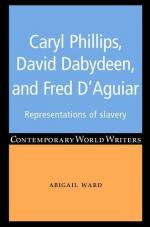|
This section contains 1,067 words (approx. 4 pages at 300 words per page) |

|
SOURCE: "Society and Its Slaves," in Times Literary Supplement, No. 4589, March 15, 1991, p. 10.
In the following review, Jaggi finds Cambridge to be "a masterfully sustained, exquisitely crafted novel."
Caryl Phillips's first two novels skilfully probed the link between Britain and the Caribbean after the Second World War. The common theme was migration, whether viewed through Leila's hopeful journey to the metropolis in The Final Passage (1985) or Bertram's tentative return to a de-colonized island following a twenty-year absence in A State of Independence (1986). In his fourth novel, Phillips resumes this Anglo-Caribbean exploration but in a nineteenth-century setting, where the nexus is not migration but slavery.
A young Englishwoman, Emily Cartwright, is despatched by her father, an absentee plantation-owner, to visit his sugar estate in the West Indies. Most of the novel (following a third-person prologue signalling her departure) consists of Emily's journal, in which her impressions of the voyage and...
|
This section contains 1,067 words (approx. 4 pages at 300 words per page) |

|


